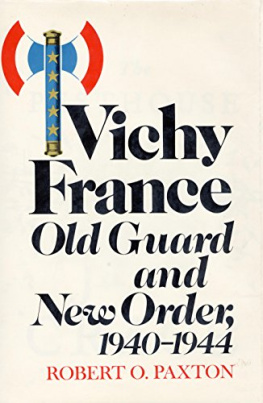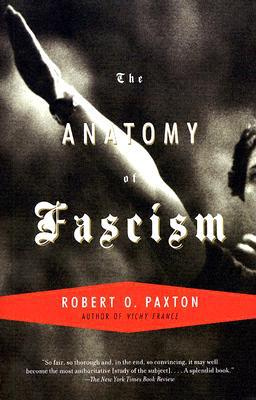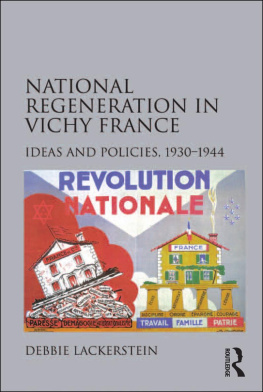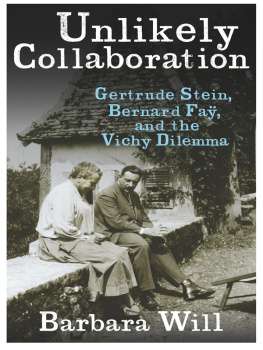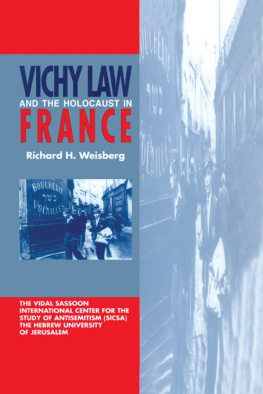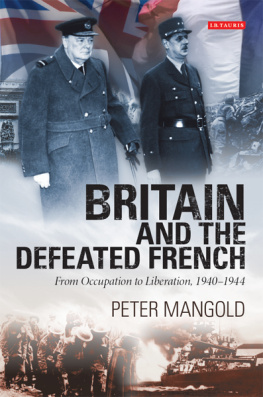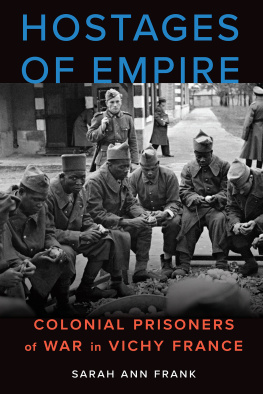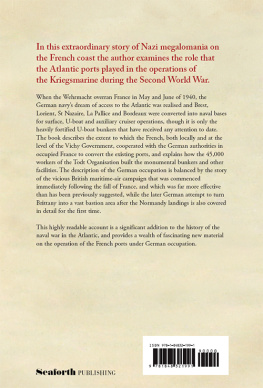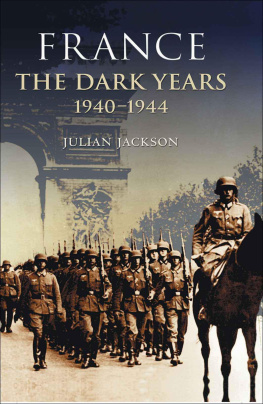ACKNOWLEDGMENTS
More people and institutions have helped with this work than I can readily acknowledge or ever hope to repay. Research in France on several occasions was made possible by the University of California Summer Faculty Fellowship program, the American Philosophical Society, and the Research Council of the State University of New York. The Institute of Social Sciences at the University of California at Berkeley purchased microfilm for me, and the Institute of International Study at Berkeley supported a summer of work in the captured German archives in Washington.
The staffs of several institutions helped me far beyond mere performance of duty: the U.S. National Archives (especially Dr. Robert Wolf), the Hoover Institution (especially Mrs. Agnes Peterson, curator of the Western and Central European Collections), the Centre de Documentation Juive Contemporaine in Paris, and the Bibliothque de Documentation Internationale et Contemporaine, also in Paris.
Research assistance by Janis Trapans in the German archives, Claudio Segr in captured Italian archives, and Mrs. Mary Lynn McDougall in social statistics was invaluable. Others whose help was indispensable are M. Henri Nogures of Paris, Warden F. W. Deakin of Saint Antonys College, Oxford, Professor Ren Rmond of the Institut dtudes politiques in Paris, and Professor Stanley Hoffmann of Harvard. Stanley Hoffmanns perceptions have crept into the very language in which modern France is discussed, on both sides of the Atlantic, to the point where my intellectual debt to him is too pervasive to calculate. More concretely, he read this work in manuscript form and saved me from several gaffes. So did Konrad Bieber, Richard F. Kuisel, Arno J. Mayer, and Judith H. Wishnia. I thank them all.
Arlene Jacobs typed a complicated manuscript in record time, and Carol Brown Janeway was a knowledgeable, wise, and sympathetic editor. I am indebted to Enrique Ucelay Da Cal for preparing the index.
These friends and helpers are in no way responsible, of course, for whatever errors, perversities of judgment, or downright idiosyncrasies may appear in this book. Those belong altogether to the author.
Also by ROBERT O. PAXTON
Parades and Politics at Vichy (1966)
Appendix A
The War Question of January 1942
No Vichy controversy better illustrates the pitfalls of seizing a few documents out of context than the war question of January 1942. Otto Abetz July 1943 memoir, published as Ptain et les allemands: Mmorandum dAbetz sur les relations franco-allemandes (Paris, 1945), claimed that Vichy had wanted to declare war on the Allies following Pearl Harbor, in exchange for political concessions, but that Hitler had missed that opportunity. The prosecution before the High Court of Justice, following up this lead, got French military justice officials in Germany to look for corroboration. They unearthed Abetz telegram no. 126 to Ribbentrop of 13 January 1942 (now microfilmed as T-120/405/21425860 and T-120/898/29196668) reporting that a rump session of the Vichy cabinet (Ptain, Darlan, Moysset, Romier, Bouthillier, Pucheu, with Benoist-Mchin also present) voted on January 11 in favor of declaring war on the Allies. In November 1945 a sealed dossier of thirty-eight documents that Benoist-Mchin had given Darlan, probably in April 1942, turned up at the Quai d Orsay. It contained, among other papers about Franco-German relations in 1941 and 1942, two letters by Benoist-Mchin to Darlan, dated 9 and 12 January 1942, concerning French readiness to declare war on the Allies in exchange for a profound modification of the current Franco-German relationship. These documents figured prominently in the later trials, such as those of Jacques Benoist-Mchin and Yves Bouthillier. Ptain was also interrograted in his prison on the Ile dYeu in January 1947, revealing that the old man was by now genuinely senile (see the report in Le Monde, 19 January 1947).
The full sequence of Franco-German government relations (best followed in Ernst von Weizsckers Frankreich file, vol. 6, T-120/405) for this period puts the whole affair into perspective. It is true that Hitler began to reopen the French question in December 1941January 1942, with Rommel being pressed toward the frontiers of Tunisia, as he always did when he needed something from France. It is also true that Darlan and Ptain, as always, were no less eager than in the fall of 1941 for a sweeping Franco-German settlement. The entry of the United States into the war on 7 December 1941 introduced the new issue of whether France would break relations or not, but the January 1942 negotiation should be seen as the last gasp of the Protocols of Paris maneuvers rather than merely as a response to the American entry into the war. The final essential point is that the January 1942 negotiation was the work of subordinates, Abetz and Benoist-Mchin, who were disavowed by superiors on both sides.
Otto Abetz found his fortunes at a low ebb following the final failure of the postprotocol negotiations at the end of 1941 and the misunderstanding of the Ptain-Goering meeting on December 1 at Saint-Florentin. Back in Germany for consultations, he had a rare meeting with Hitler on January 5, 1942. This heady experience seems to have prompted him to mount a major diplomatic scheme of his own. Hitler, who wanted the use of Bizerte for aid to Rommel, seems to have mused about the possibilities of meeting Darlan and of negotiating a peace settlement with France in the event of a French entry into war against the Allies. For the moment, however, even a French rupture of diplomatic relations was put off for further consideration. (See Abetz report to Ribbentrop of this meeting, T-120/405/21423839, and Mmorandum dAbetz, 12839.) Hitler may have been tempted by the idea of shifting occupation forces from France to the Russian front.
Back in Paris on January 9, Abetz sought out Jacques Benoist-Mchin, the prewar propagandist for a French understanding with Hitler who was now Secretaire-gnral la vice-prsidence du conseil and Darlans roving negotiator with the Germans. Hitlers rather hypothetical musings now blossomed into a firm four-point offer. If France was ready to march with us to the end of the conflict, there could be a profound modification of the current Franco-German status, preliminary accord over a peace treaty, study of material and economic means France would need to meet her new responsibilities and of the best way to present the matter to French public opinion. If the French were agreed in principle (and Hitler did not want an immediate French declaration of war), Hitler, Abetz said, was ready to grant a Treaty of Peace which will astonish the French. Benoist-Mchin reported this proposal, perhaps further inflated, in his letter of 9 January to Darlan [see text in Procs Benoist-Mchin (Paris, 1948), 34046]. He asked for a reply by the following Monday.
There is no reason to doubt that these issues were indeed discussed at Vichy. A sweeping settlement was just what Darlan had been working for since February 1941. General Juin had just been in Berlin working out what would happen if Rommel had to withdraw into Tunisia, thus bringing the North African desert war onto French soil. Ptain had just seen Goering, with a fat dossier of concessions the French wanted in exchange for their cooperation in such matters. The reply that Benoist-Mchin brought back on 12 January (see text in Procs Benoist-Mchin, 34749) was affirmative in general principles but surrounded by all sorts of qualifications. Benoist-Mchin pointed out to Abetz that in no case could France be drawn into operations that would require total or partial mobilization. Vichy was apprehensive about too quick action. A solution must move by stages, with clear material and psychological preparation in advance. Benoist-Mchin talked mostly about African operations, to which he said Vichy was already committed by Ptains agreement about Rommel. In other words, the same Vichy plea for caution and for concessions that would strike public opinion in the eye, coupled with an interest in an overall settlement. There was no mention of immediate French war on the Allies.

